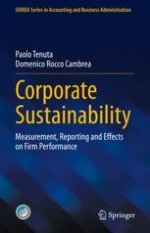This book introduces readers to the main types of corporate sustainability practices. The first section examines both the ratings provided by international agencies and the various ESG (Environmental, Social and Government) indexes existing at 2021. In turn, the second part empirically investigates the relationship between the level of corporate sustainability and corporate financial performance among the large companies listed on the Milan Exchange FTSE-MIB 40 index for 2015-2019.
The book offers a comprehensive overview of current sustainability concepts and practices and illustrates how various companies are seeking to integrate them in their competitive strategy. Further, it fills a gap in the extant literature by analysing the origins, historical evolution and structure of the main rating agencies and ESG indexes. In addition, the empirical analysis of corporate sustainability’s impact on companies’ financial performance reveals the importance of collegial leadership – a commonly found feature of Italian family businesses that has not been considered in previous studies – as a moderating factor for reconciling sustainability initiatives and performance at family-run firms.
